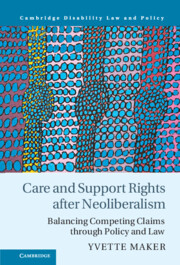Book contents
- Care and Support Rights after Neoliberalism
- Cambridge Disability Law and Policy Series
- Care and Support Rights after Neoliberalism
- Copyright page
- Contents
- Table
- Foreword
- Acknowledgments
- Abbreviations
- Introduction
- Part I Care Policy Tensions
- 1 A Feminist Dilemma
- 2 The Universal Caregiver Model
- 3 Disability Rights and Carers’ Advocacy
- 4 A Disability Rights–Informed Ethics of Care
- Part II Balancing Competing Claims through Rights-Based Policy and Law
- Part III Care and Support Policy Tensions in Two Liberal Welfare States
- Index
- Other Books in the Series
3 - Disability Rights and Carers’ Advocacy
To Reject or to Recognize Care?
from Part I - Care Policy Tensions
Published online by Cambridge University Press: 21 April 2022
- Care and Support Rights after Neoliberalism
- Cambridge Disability Law and Policy Series
- Care and Support Rights after Neoliberalism
- Copyright page
- Contents
- Table
- Foreword
- Acknowledgments
- Abbreviations
- Introduction
- Part I Care Policy Tensions
- 1 A Feminist Dilemma
- 2 The Universal Caregiver Model
- 3 Disability Rights and Carers’ Advocacy
- 4 A Disability Rights–Informed Ethics of Care
- Part II Balancing Competing Claims through Rights-Based Policy and Law
- Part III Care and Support Policy Tensions in Two Liberal Welfare States
- Index
- Other Books in the Series
Summary
This chapter discusses a second source of care and support policy tension – the tension between supporting the claims of carers and supporting those of people with disabilities. Organized carer movements in Australia, the UK and other liberal welfare states have argued successfully for policy support on the basis of the burden of providing intensive care to older persons and/or children and adults with disabilities. Disability studies scholars and activists have challenged this characterization of disability as an individual deficit and source of burden, arguing instead that disability is a consequence of a failure to accommodate difference and recognize the rights of people with disabilities. They have advocated instead for policies that enable people with disabilities to be independent and choose how they live. Each approach has some benefits for one constituency at the expense of others. Support for carers to ‘care’ can produce disempowering arrangements for people with disabilities, while independent living arrangements sought by people with disabilities may disempower support workers if they do not have appropriate pay and conditions. Calls for choice and independent living have also coincided with the neoliberal marketization of care and support, resulting in a narrowing of choice that is only available to some.
Keywords
- Type
- Chapter
- Information
- Care and Support Rights After NeoliberalismBalancing Competing Claims Through Policy and Law, pp. 54 - 79Publisher: Cambridge University PressPrint publication year: 2022

